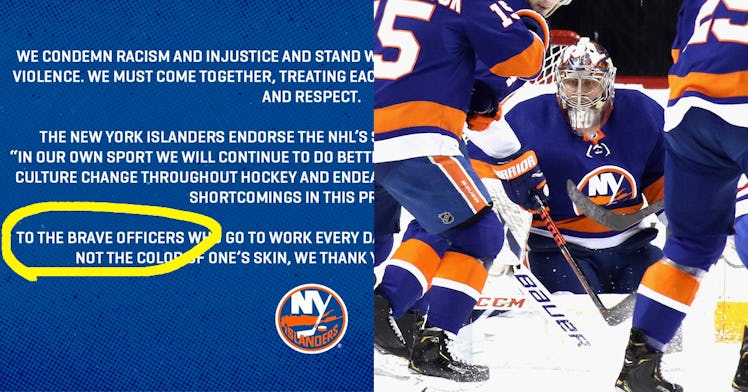When It Comes To Supporting Protests, Most Teams Are Bad Sports
From toothless statements to silence, pro-sports teams have not acted like the community leaders they claim to be.

American sports teams do a lot to foster the impression that they’re integral parts of their communities. They contribute funds to local non-profits, offer players as ambassadors at local events, and tout the supposed economic benefits of their presence to the community, particularly when trying to secure public funds for a new arena or stadium.
The least these teams can do when a genuine crisis rolls around is join the chorus of local voices (every protest march or rally is an inherently local event, after all) speaking out against police brutality and racism, forces that negatively impact fans, players, and communities. Case in point: the Brooklyn Nets might be an international brand, but their home games are played at the Barclays Center in Brooklyn, the locus of many of the protests in New York in recent days (one of which I personally attended).
And yet, an Axios analysis shows that four teams in the four major American sports leagues have not issued a statement via an official social media channel about the George Floyd protests. (The New York Yankees sent out a tweet as this piece was being written.)
Washington’s NFL team, the Cincinnati Bengals, and the New York Knicks and Rangers — make up this ignominious quartet. But the emptiness of many of the statements that escaped from other teams’ PR departments means they’re not the only four that deserve scorn.
The vapid way in which many teams have handled the protests following the death of George Floyd is evidence that much of these franchises’ talk about their connection to the places they’re located in is just that: talk.
Consider this statement shared by the New York Islanders.
In this word salad, the Islanders come out against “racism and injustice” — not exactly a bold stand, and certainly not one that should earn anyone a pat on the back. The call to “come together, treating each other with empathy, dignity, and respect” is similarly meaningless, but the statement’s celebration of the police is not.
Celebrating “the brave officers who go to work every day seeing the human being and not the color of one’s skin” in the final sentence is the most egregious pondering of all, a sign that the team’s fear of pissing off any reflexively pro-law enforcement fans, of which there are many on Long Island, negates any sincere desire for reform that team leadership might have.
The Washington Wizards did a much better job. They’re the exception, not the rule.
It mentions the names of three recent victims of racist police violence. It calls out police brutality as part of the problem and calls the cops who took their lives murderers, and it calls for us to “get out of our comfort zones and stand for what’s right.” The Islanders’ statement is written from deep within that comfort zone, which is why it’s such a failure.
The Wizards’ statement, which was notably written by “players and coaches,” even states that being “highly invested in our communities in DC” is “not nearly enough,” a rebuke of every team donation to a local school or food bank made because it will pay for itself with positive PR.
Look, no one is expecting professional sports teams to solve racism or police brutality in the United States. But the vast majority of them receive special treatment from local governments — the same governments responsible for the violence of their police forces — and recognition as pillars of the community.
And when their only response to injustice in those communities is silence or platitudes, they deserve neither.
This article was originally published on